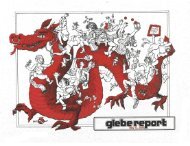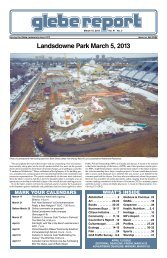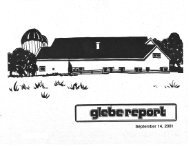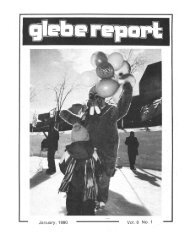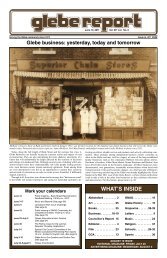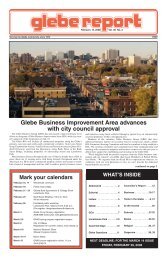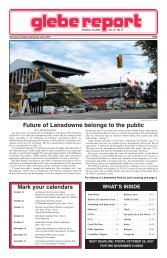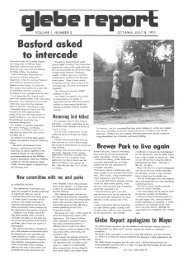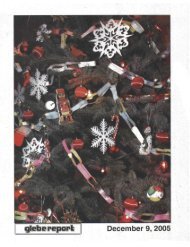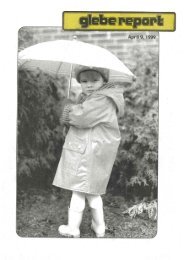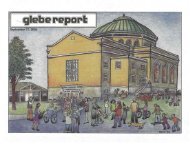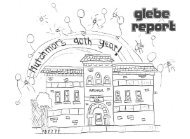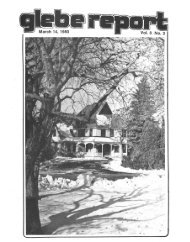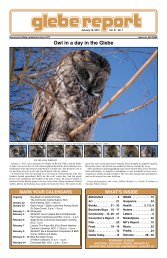You also want an ePaper? Increase the reach of your titles
YUMPU automatically turns print PDFs into web optimized ePapers that Google loves.
BOOKS<br />
61111,<br />
Art and academia mesh in author's career<br />
By<br />
Sharon<br />
Drache<br />
ANOTHER COUNTRY<br />
writings by and about Henry Kreisel.<br />
Edited by Shirley Neuman. NeWest<br />
Press, 362 pages, $19.95 cloth, $9.95<br />
paper.<br />
Henry Kreisel is a man<br />
obsessed with remembering<br />
the past at the same time as<br />
he continually discovers the<br />
present. Writings by and<br />
about him reflect the image<br />
of a man standing between<br />
two worlds while also providing<br />
a detailed study of<br />
the successful combination<br />
of a richly led academic and<br />
literary life. In her introductions<br />
to diverse selections<br />
including a diary,<br />
personal correspondence,<br />
some early and recent fiction<br />
and several essays, editor<br />
Shirley Neuman endeavours<br />
to pay tribute to<br />
Kreisel not only for his accomplishments<br />
as an author'<br />
and an academic but also for<br />
his devotion to his adopted<br />
country, Canada.<br />
Immigration<br />
She begins where Kriesel<br />
began when he came to Canada<br />
in 1940, not as an ordinary<br />
immigrant but as a Jewish<br />
refugee who had fled the<br />
Anschluss in Austria in 1938<br />
only to be welcomed at British<br />
and subsequently Canadian<br />
borders as an 'enemy<br />
alien'. Fellow internee,<br />
Eric Koch, described the unjust<br />
incarceration in his<br />
book Deemed Suspect: A Wartime<br />
Blunder (1980) but<br />
Kreisel's diary (some of<br />
which is reproduced in<br />
Koch's book) stands as an<br />
unadorned archival document.<br />
Later, in 1956, in a letter<br />
to his close friend Robert<br />
Weaver, Kreisel addresses<br />
his sense of outrage at<br />
being a double victim, first<br />
of Nazi tyranny and then because<br />
of his nationality.<br />
He speaks to the paradox of<br />
his internment which gave<br />
him a block of time to read<br />
and study precisely when he<br />
needed it. "It should be<br />
said that the camps here<br />
were intellectually stimulating...the<br />
place lousy with<br />
doctors of all sorts, medicine,<br />
philosophy and theology.<br />
Sitting around a bunk at<br />
night, an orthodox rabbi<br />
would argue with a neo-Thom-<br />
.<br />
ist and a Marxist was having<br />
it out with a Platonist...in<br />
this casual manner I was initiated<br />
into the world of<br />
ideas." Kreisel claims the<br />
most important event of his<br />
own camp life was his decision<br />
to write creatively,<br />
not in his native German,<br />
but in English. He tried to<br />
get his hands on some books<br />
by Canadian authors but couldn't.<br />
To address his surprise<br />
at that time and since<br />
on the topic of discovery of<br />
the Canadian literary landscape,<br />
Neuman includes<br />
Kreisel's hard-hitting, humorous<br />
essay, 'Has Anyone<br />
Here Heard of Marjorie<br />
Pickthall?' written for the<br />
100th anniversary issue of<br />
Canadian Literature (Spring<br />
1984).<br />
The book reads like a memoir,<br />
thanks to Neumans careful<br />
sequencing and bridging<br />
of selections. She traces<br />
Kreisel's career from<br />
his student days in English<br />
language and literature at<br />
the University of Toronto<br />
in the mid-forties to the<br />
publication of his highly<br />
acclaimed first novel, The<br />
Rich Man (1948). Kreisel'<br />
comments on the literary<br />
climate of the forties, not<br />
in Montreal which we have<br />
heard so much about from the<br />
First Statement and Preview<br />
people, but in Toronto.<br />
The Modern Letters Club<br />
was founded by Kreisel,<br />
Robert Weaver, the late<br />
Robert Sawyer and James<br />
Reaney. Writers met to discuss<br />
modern literature and<br />
read their works in progress<br />
"At the time E.J. Pratt was<br />
at Victoria College and<br />
Phillip Child was at Trinity<br />
Northrop Frye was beginning<br />
to exercise enormous influence<br />
and Marshall McLuhan<br />
was beginning his explorations<br />
at St. Michael's."<br />
Academic and author<br />
Kreisel wrote his master's<br />
thesis on poet A.M. Klein's<br />
Hath Not a Jew (1940).<br />
Klein had come to Canada<br />
when he was school age and<br />
Kreisel when he was eighteen.<br />
It was exciting to young<br />
Kreisel to find a literary<br />
soul mate. Klein's ability<br />
to embrace the Biblic and<br />
Rabbinic simultaneously with<br />
Canadian custom emboldened<br />
Kreisel to affirm his own<br />
Jewish heritage.<br />
Neuman aptly portrays<br />
Kreisel, the academic, alongside<br />
Kreisel, the author,<br />
for both aspects deal with<br />
the man's essence. He was<br />
himself an exile who had to<br />
work doubly hard to make a influences in Kreisel's<br />
contribution to his adopted writing. Joseph Conrad has<br />
country. Being a creative been a literary presence<br />
writer wasn't enough for much in the same way as<br />
Kreisel. He wanted a time- Klein. But with Conrad,<br />
bound occupation. He left Kreisel latched on to his<br />
the University of Toronto to exile and his choice to<br />
teach at the University of write in English instead of<br />
Alberta. Among his accomp- his native Polish.<br />
lishments since he began his T.S. Eliot's Waste Land<br />
teaching career in 1947 were is also important. Kreisel<br />
the introduction of the writes a memoir of Vienna,<br />
first course in Canadian published here for the first<br />
literature at that univer- time, in which he describes<br />
sity, the Chairmanship of Vienna as a waste land city,<br />
the English Department and a city of darkness and light,<br />
the administrative role of and certainly not the Vienna<br />
Vice President (Academic) he chooses to remember.<br />
from 1970 to 1975.<br />
Should Canadians wish to<br />
learn about a writer steeped<br />
in the tradition of<br />
Goethe and Schiller who is<br />
equally excited by A.M.<br />
Klein (1909-1972) and Hugh<br />
MacLennan, then Henry<br />
Kreisel, the writer-teacher<br />
is one of our best examples.<br />
In a talk he gave for the<br />
CBC on Problems of Writing<br />
in Canada, he didn't agree<br />
with Chester Duncan who said,<br />
"We haven't discovered what<br />
we are or where we are going<br />
and therefore we haven't<br />
much to say." Kreisel maintained<br />
his own experience<br />
had taught him otherwise.<br />
He singled out for praise<br />
two Canadian authors who had<br />
lots to say about Canada,<br />
Author Dr. Henry KriAsel his friends and former students,<br />
Robert Kroetsch and<br />
He was asked to stand for<br />
Rudy Weibe.<br />
the Presidency, says Neuman<br />
The essence of this book<br />
but he declined, choosing to<br />
is the affirmation in one<br />
devote his time to the other<br />
man's writings that art and<br />
facet of his personality,<br />
academia do mesh and that<br />
his writing, which with the<br />
the Canadian literary landexception<br />
of a second novel,<br />
scape is flourishing.<br />
The Betrayal (1964), several<br />
academic and literary essays<br />
and sprinkling of stories,<br />
had been in limbo.<br />
Editor Neuman describes<br />
Kreisel as a slow, methodical<br />
writer for whom periods<br />
of not writing have always<br />
been as important as periods<br />
of creativity. One feeds<br />
the other and after a lifetime<br />
of teaching and university<br />
administration, Kreisel<br />
has in fact had a burst of<br />
creative energy. In 1981,<br />
he published a collection of<br />
short fiction, The Almost<br />
Meeting, which won the J.I.<br />
Segal Literary Award.<br />
The inclusion in this volume<br />
of two recently written<br />
stories, An Evening with<br />
Sholem Aleichem and To Visit<br />
Mother Rachel's Grave, respectively<br />
underscores<br />
Kreisel's devotion to the<br />
tradition of Yiddish storytelling<br />
and to the Biblical<br />
past.<br />
Interviews with Felix<br />
Cherniavsky and Mervyn<br />
Butovsky address literary<br />
June 6, 1986, GLEBE REPORT -25



